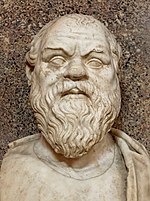Yeah, given my blog name and handle, it sounds ironic for me to say that, no?
Of course, some people might accuse me of being hypocritical, if I do think he's overrated. That said, my blog name trades on the myth of Socrates, which we shall now call into account ... by using some Socratic-like questioning!
Questions
1. If he really were ignorant of so much, how could he always be right in his dialogues -- especially since he proves his opponents wrong in every one of them and therefore he couldn't have learned from them?
2. If he really were so ignorant, and knew that he were, then why didn't he follow Wittgenstein and remain silent about what he did not know?
3. If he really were so ignorant, then how can we believe he understood the Sophists' teachings so well?
Answers
The baseline answer to all of these individual questions and more is that Socrates, that is, the Socrates who is a Platonic mouthpiece (and, an ideal one for Plato, pun intended!) makes straw men out of Sophists and their thought, opposes the democratization (for money) of knowledge that they offer because it upsets his classist views and more.
But, specifically:
1A. The Platonic wordsmith hoists him by his own petard, not to mention, especially in the Cave analogy, also getting hoist on the petard of ineffability.
2A. Because it does that, Plato's Socrates only mimicked the idea of being ignorant.
3A. This builds on the "baseline" answer. In a sense, Socrates, to the degree we can really guess at who he was, DOES know the ideas of the Sophists well — and fears their democratizing strain.
Beyond that, while I don't buy into every argument Izzy Stone made in "The Death of Socrates," I do think he was anti-democratic and an elitist. Rather than the crime of affronting the gods of the polis, what he really was guilty of, in modern American legal terminology, arguably, was treason. So, contra Aristotle, mourn not his death as being in the nature of a crime against philosophy.
Besides that, from Xenophon and Aristophanes, especially the latter, we have a somewhat different version of Socrates. Indeed, Aristophanes calls Socrates, not any opponents of his (not mentioned in "The Birds") a Sophist.
Some additional thoughts:
Unfortunately, philosophical smarts, just like atheism (especially Gnu Atheism) and Professional Skepticism(TM) are no guarantors of being good secular humanists.
Both Socrates and Plato were anti-democratic elitists.
David Hume, despite all his other common sense, and being one of my favorite philosophers, was a racist. (And, Nov. 27, 2020, update, per David Harris' 2015 bio, which I've now read, in many of his Essays Moral and Political, distressingly shallow, as if le bon David followed Addison too much and acted like he was writing for the 1750s British equivalent of New Yorker readers at best.)
But, speaking of skepticism, and as a philosophy, not an investigative movement, Diogenes was, well, Diogenes! Maybe not a humanist in every way, but, he certainly was true to himself.
And here's more thoughts of mine on overrated and underrated philosophers in general.
And, this means that Plato is also overrated, for erecting such a blatant straw man in Socrates.
A skeptical leftist's, or post-capitalist's, or eco-socialist's blog, including skepticism about leftism (and related things under other labels), but even more about other issues of politics. Free of duopoly and minor party ties. Also, a skeptical look at Gnu Atheism, religion, social sciences, more.
Note: Labels can help describe people but should never be used to pin them to an anthill.
As seen at Washington Babylon and other fine establishments
August 28, 2013
Subscribe to:
Post Comments (Atom)

1 comment:
Philosophy and I don't get along well. It took me five tries to get through Robert Pirsig's Zen and the Art of Motorcycle Maintenance, and all I got out of it was that when there is such a huge debate over the meaning of the word "value", the only conclusion I can draw is that philosophers need to get jobs and connect with the reality the rest of us must face daily.
Maybe this should also apply to Socrates, whose constant assertions that only he was correct turned me off.
Post a Comment